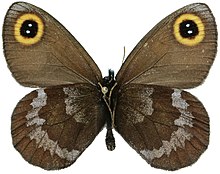Erebia cyclopius is a species of butterfly of the subfamily Satyrinae in the family Nymphalidae. It is found through Siberia (from the Urals to the Far East), northern Mongolia, northern China and North Korea.[1] The habitat consists of forest edges, flowery meadows and sparse larch forests.
| Erebia cyclopius | |
|---|---|

| |
| E. cyclopius male underside - Anuchinsky District, Primorsky Krai, Russia | |
| Scientific classification | |
| Domain: | Eukaryota |
| Kingdom: | Animalia |
| Phylum: | Arthropoda |
| Class: | Insecta |
| Order: | Lepidoptera |
| Family: | Nymphalidae |
| Genus: | Erebia |
| Species: | E. cyclopius
|
| Binomial name | |
| Erebia cyclopius (Eversmann, 1844)
| |
| Synonyms | |
| |
The wingspan is 46–62 mm.
Description in Seitz
editE. cyclopius Ev. (35 c). Upperside grey-brown. The forewing has on both surfaces a subapical, nearly circular, black ocellus with 2 white pupils and ochre-yellow border. The underside of the forewing is somewhat lighter than above and the yellow border of the eye-spot is much wider, the apex of the wing being feebly dusted with bluish grey. The hindwing beneath at the base likewise dusted with bluish grey for a considerable distance; a submarginal band bluish ashy grey, in some places interrupted by the ground-colour. The ocelli of the female are larger and more broadly ringed with yellow than in the male, the apex of the wing being more densely dusted with grey-blue. Antenna ringed black and white, the club russet yellow. — In the Ural, Altai, and Kentei Mts., on the Amur and its tributaries, and on Askold; in May, June and July in damp pine-woods, locally abundant. The largest specimens occur on Askold, having an especially large subapical ocellus.[2]
Adults are on wing from June to July.
The species overwinters in the larval stage.[3]
Subspecies
edit- Erebia cyclopius cyclopius (southern Urals, central and southern Siberia, the Altai and Sayan Mountains, Transbaikalia)
- Erebia cyclopius aporia Schawerda, 1919 (Amur, Ussuri)
- Erebia cyclopius yoshikurana Kishida & Nakamura, 1941 (Sakhalin)
References
edit- ^ "Erebia Dalman, 1816" at Markku Savela's Lepidoptera and Some Other Life Forms
- ^ Eiffinger, G. in Seitz, A. ed. Band 1: Abt. 1, Die Großschmetterlinge des palaearktischen Faunengebietes, Die palaearktischen Tagfalter, 1909, 379 Seiten, mit 89 kolorierten Tafeln (3470 Figuren) This article incorporates text from this source, which is in the public domain.
- ^ Russian Insects